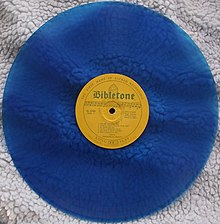
In music, a single is a type of release, typically a song recording of fewer tracks than an LP record or an album. One can be released for sale to the public in a variety of formats. In most cases, a single is a song that is released separately from an album, although it usually also appears on an album. In other cases a recording released as a single may not appear on an album.

An extended play record, usually referred to as an EP, is a musical recording that contains more tracks than a single but fewer than an album or LP record. Contemporary EPs generally contain four or five tracks, and are considered "less expensive and time-consuming" for an artist to produce than an album. An EP originally referred to specific types of records other than 78 rpm standard play (SP) and LP, but it is now applied to mid-length CDs and downloads as well.

Columbia Records is an American record label owned by Sony Music Entertainment, a subsidiary of Sony Corporation of America, the North American division of Japanese conglomerate Sony. It was founded on January 15, 1889, evolving from the American Graphophone Company, the successor to the Volta Graphophone Company. Columbia is the oldest surviving brand name in the recorded sound business, and the second major company to produce records. From 1961 to 1991, its recordings were released outside North America under the name CBS Records to avoid confusion with EMI's Columbia Graphophone Company. Columbia is one of Sony Music's four flagship record labels, alongside former longtime rival RCA Records, as well as Arista Records and Epic Records.

A phonograph record, or simply a record, is an analog sound storage medium in the form of a flat disc with an inscribed, modulated spiral groove. The groove usually starts near the periphery and ends near the center of the disc. At first, the discs were commonly made from shellac, with earlier records having a fine abrasive filler mixed in. Starting in the 1940s polyvinyl chloride became common, hence the name "vinyl".
RCA Records is an American record label currently owned by Sony Music Entertainment, a subsidiary of Sony Corporation of America. It is one of Sony Music's four flagship labels, alongside RCA's former long-time rival Columbia Records; also Arista Records, and Epic Records. The label has released multiple genres of music, including pop, classical, rock, hip hop, afrobeat, electronic, R&B, blues, jazz, and country. Its name is derived from the initials of its defunct parent company, the Radio Corporation of America (RCA). RCA Records was fully acquired by Bertelsmann in 1987, making it a part of Bertelsmann Music Group (BMG) and became a part of Sony BMG Music Entertainment after the 2004 merger of BMG and Sony; it was acquired by the latter in 2008, after the dissolution of Sony/BMG and the restructuring of Sony Music. RCA Records is the corporate successor of the Victor Talking Machine Company, founded in 1901, making it the second-oldest record label in American history, after sister label Columbia Records, founded in 1889.
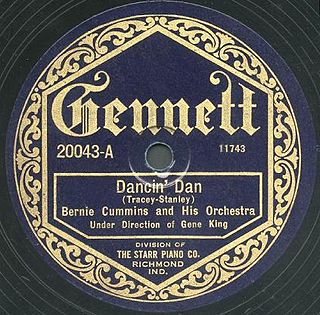
Gennett was an American record company and label in Richmond, Indiana, United States, which flourished in the 1920s. Gennett produced some of the earliest recordings by Louis Armstrong, King Oliver, Bix Beiderbecke, and Hoagy Carmichael. Its roster also included Jelly Roll Morton, Blind Lemon Jefferson, Charley Patton, and Gene Autry.

The twelve-inch single is a type of vinyl gramophone record that has wider groove spacing and shorter playing time with a 'single' or a few related sound tracks on each surface, compared to LPs which have several songs on each side. This allows for louder levels to be cut on the disc by the mastering engineer, which in turn gives a wider dynamic range, and thus better sound quality. This record type is commonly used in disco and dance music genres, where DJs use them to play in clubs. They are played at either 33+1⁄3 or 45 rpm. The conventional 7‐inch single usually holds three or four minutes of music at full volume. The 12‐inch LP sacrifices volume for extended playing time.

American Record Corporation (ARC), also referred to as American Record Company, American Recording Corporation, or ARC Records, was an American record company.

An acetate disc is a type of phonograph record generally used from the 1930s to the late 1950s for recording and broadcast purposes and still in limited use today.

The overwhelming majority of records manufactured have been of certain sizes, playback speeds, and appearance. However, since the commercial adoption of the gramophone record, a wide variety of records have also been produced that do not fall into these categories, and they have served a variety of purposes.
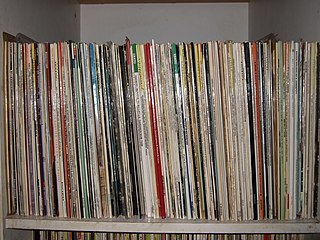
Record collecting is the hobby of collecting sound recordings, usually of music, but sometimes poetry, reading, historical speeches, and ambient noises. Although the typical focus is on vinyl records, all formats of recorded music can be collected.

Third Man Records is an independent record label founded by Jack White, Ben Blackwell and Ben Swank. White first registered the label on paper in 2001 in Detroit, Michigan, then was joined by Blackwell and Swank to establish the label's first physical location—a combination of record store, performance venue, and headquarters—in Nashville, Tennessee, in 2009. The label opened a Detroit branch location in 2015, which added a pressing plant in 2017. Their third store in Soho, London, opened in 2021.

A matrix number is an alphanumeric code stamped or handwritten into the run-out groove area of a phonograph record. This is the non-grooved area between the end of the final band on a record's side and the label, also known as the run-off groove area, end-groove area, matrix area, or "dead wax".

Skylite Recording Company is a Memphis based gospel music label started by The Statesmen Quartet and The Blackwood Brothers in 1959. Along with The Blackwood Brothers and The Statesmen Quartet, Skylite signed, among others, The Speer Family, and the Oak Ridge Quartet. In 1966, the Statesmen-Blackwood team sold the record company to a group of investors led by Joel Gentry, with main offices on Music Row in Nashville, Tenn.
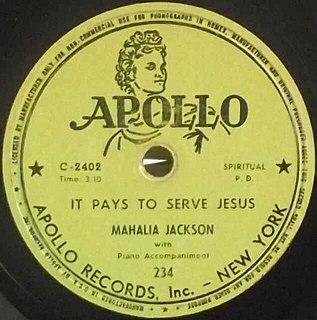
Apollo Records was a record company and label founded in New York City by Hy Siegel and Ted Gottlieb in 1944. A year later it was sold to Ike and Bess Berman. Apollo was known for blues, doo-wop, gospel, jazz, and rock and roll.

The LP is an analog sound storage medium, a phonograph record format characterized by: a speed of 33+1⁄3 rpm; a 12- or 10-inch diameter; use of the "microgroove" groove specification; and a vinyl composition disk. Introduced by Columbia in 1948, it was soon adopted as a new standard by the entire record industry. Apart from a few relatively minor refinements and the important later addition of stereophonic sound, it remained the standard format for record albums until its gradual replacement from the 1980s to the early 2000s, first by cassettes, then by compact discs, and finally by digital music distribution.
The LeFevres, or The Singing LeFevres, were an American Southern gospel singing group, active for nearly 50 years in the middle of the twentieth century.
Audiophile Records is a record company and label founded in 1947 by Ewing Dunbar Nunn to produce recordings of Dixieland jazz. A very few of the early pressings were classical music, Robert Noehren on pipe organ, AP-2 and AP-9 for example.
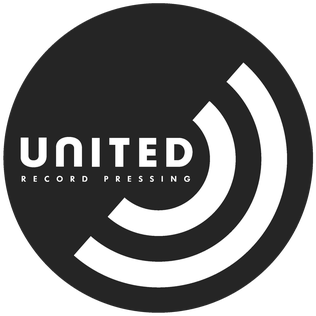
United Record Pressing is a vinyl pressing plant located in Nashville, Tennessee, that has been in operation since 1949. United has pressed records for such artists as The Beatles, Stevie Wonder, Michael Jackson, Jack White, Adele, Mumford & Sons, Hank Williams Jr., Marie Osmond, Tammy Wynette, Loretta Lynn, Dolly Parton, Lady Antebellum, Justin Timberlake, Kanye West, Kings of Leon, Fall Out Boy, Kendrick Lamar, The Black Keys, The Roots, and Radiohead.
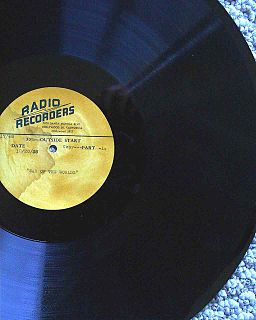
Electrical transcriptions are special phonograph recordings made exclusively for radio broadcasting, which were widely used during the "Golden Age of Radio". They provided material—from station-identification jingles and commercials to full-length programs—for use by local stations, which were affiliates of one of the radio networks.

